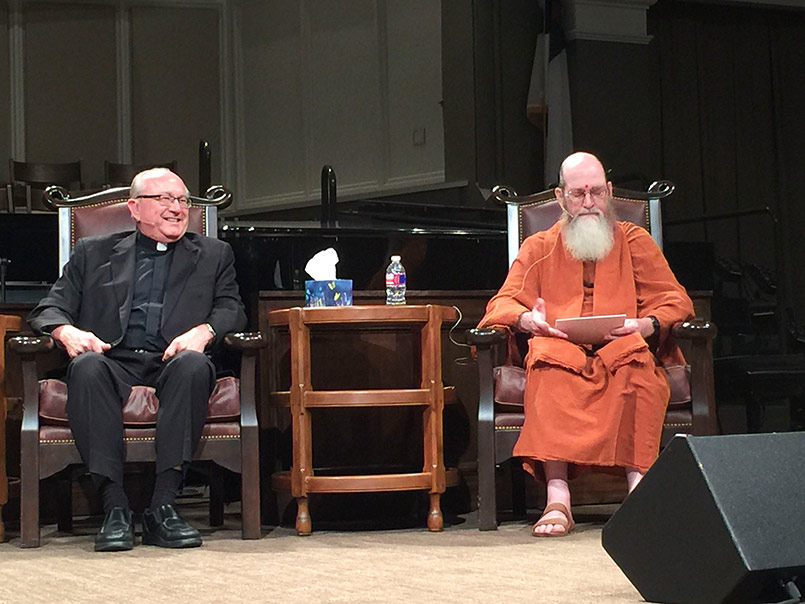Interfaith Event Q & A

We are delivering the full question and answer text as a downloadable PDF. Here is an example of the first question and answer...
Religious persecution appears to be unprecedented around the world. How can people of all faiths work together to make religious freedom a universal right?
A. Despite the proliferation of bad news flooding our screens lately, I would not agree that today's religious persecution is unprecedented. Globally, it has been far worse in the past. Then, persecution resulted from the king's understanding of his faith. For example, in the Mughal Empire under Aurangzeb in the 17th century, millions of Hindus were subject to the Muslim jizya tax on non-believers and thousands of temples were destroyed. Even here in Texas, other religions were outlawed under Spanish rule in 1820, though local officials didn't actually enforce that very well. Still, just 200 years ago, it was the law. Historically in India, Hindu rulers have not restricted religious practice. With some exceptions, the Buddhist, Jain, Christian, Jewish, Parsee, Sikh and tribal religions in India have all freely coexisted under Hindu, Buddhist and Sikh rule.
We find today's starkest case of persecution of Hindus (as well as Christians and others) in Pakistan, where the Hindu population was 22% at the time of India's partition in 1947. Today that has plummeted to 1.7%, because they make it so difficult and even dangerous to be a Hindu. For example, it was only this year, 68 years after independence, that the government finally passed a law allowing Hindu marriages to be legally registered. But even that has yet to go into effect.
Religious tolerance depends in part upon people of different religions getting to know each other. When Swami Vivekananda came to the US for the Parliament of the World Religions in 1893, it was for many in attendance the first time they had ever heard a Hindu speak. Protestant groups of the time who were active in sending missionaries to India to convert those they considered heathens were taking aback by Vivekananda who spoke so eloquently and seemed anything but primitive. That visit permanently changed the attitude of some ministers and many in the media.
Fifty years ago there were few Hindus in Texas; now there are a quarter million. The Muslim community has also burgeoned. So we need to take time to get to know and understand each other. As mutual respect is developed, religious freedom should flow naturally and persecution will diminish. There's the current controversy here in Farmersville, Texas, about a Muslim cemetery. Reading a National Public Radio article, I was impressed by one person interviewed, Harvey Sisco, who has lived in Farmersville for more than 60 years. He said he has a good relationship with the few Muslim people he knows and has no problem with the cemetery. He is not against them, so he is not against their need to respect their dead.
I would add, however, that for some Christians in Asia, "religious freedom" is code for the freedom to gain converts by coming into a struggling or recently devastated community, and offering food, housing, money, education and other inducements. This was just seen following the April earthquake in Nepal, where instant tweets went out saying the earthquake was a blessing that would open the nation to a harvest of souls because of the opportunities created while giving aid. There were credible reports that some Christian aid workers on the ground there would only help those willing to convert. The same thing happened in South India following the 2004 tsunami. To me, such activities are not an expression of "religious freedom."
2 Responses to “Interfaith Event Q & A”
From Our Gurus' Teachings
Archives are now available through 2001. Light colored days have no posts. 1998-2001 coming later.

September 14th, 2015 at 9:27 pm
RT @KauaiMonastery: New blog post: Interfaith Event Q & A http://t.co/N7BP84oByE
September 15th, 2015 at 1:56 am
This made a great mid-day read! Thank you! AUM